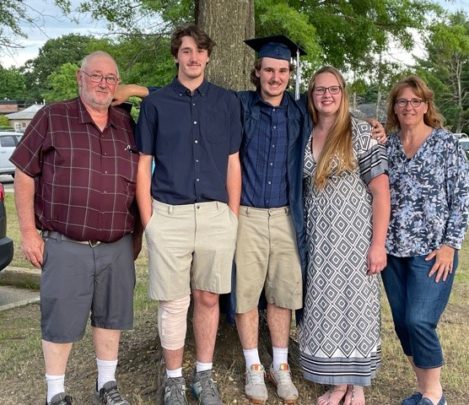Margie Meikle has some advice for new foster parents: “Go all in.”
“Once you commit to foster parenting, you can’t have reservations, because if you have reservations, the kids are going to see that,” she said. “I’m not saying don’t be smart — don’t put blinders when it comes to challenging behavior. But keep one eye open all the time. In all honesty though, that’s just ‘parenting’ isn’t it?”
Meikle should know. Over 13 years of foster parenting with her husband Rich, Meikle’s family — which includes two biological teen sons and an adult daughter — has shared their home with close to 40 HopeWell children experiencing foster care.
Some children stayed for just a matter of hours or days due to a crisis in their primary home, while awaiting a more permanent placement or because their primary foster parent was temporarily unable to care for them due illness or travel. Others stayed for a couple years before returning to live with a biological family. Still others spent four or five years with the Meikles, completing their education and “aging out” of the system to live independently.
Their very first child, a 12-year-old boy, was with them for two years, during which time he participated in all family activities, including weekend fishing and camping trips several times a month. Eventually, he was placed in the care of his grandparents. As he departed, he told the Meikles, “I’ll always remember having dinner together as a family.”
“That almost destroyed me,” Margie recalled. “Even after all the fun stuff, what he took away from our family was that we made a point to eat together as a family every night.”
Today, her household is made up of four teenage boys, her 16- and 17-year-old biological sons, and two 16-year-old sons in foster care.
“Milk is one of my nemeses” she joked, noting that she can’t understand why — among the four boys — none seem to be able to remember to put the milk away.
Kidding aside, Margie is forthright about the challenges that come with loving and raising children who have experienced a range of instability, trauma, abuse, and neglect in their young lives. Children in Meikle and her husband’s care have physically assaulted them and destroyed property. Others have displayed behavior that seems inexplicable but for their history of loss or abuse: the child who crawled under the table and threw a tantrum at lunch because he feared the repercussion of telling Meikle that he didn’t like sandwiches.
What Margie has learned through these experiences is to expect the unexpected. “Things happen that surprise the crap out of you,” she said, “but just because it’s surprising to you doesn’t mean it’s not normal for the child.”
She’s also learned to not take a child’s behavior personally.
“It may feel personal in the moment, but it’s not,” Meikle said. “These children didn’t ask for these lives and they’re dealing with emotions and wounds that ultimately have nothing to do with you.”
Meikle credits HopeWell’s extensive support system for foster parents for helping their entire family succeed. From intensive training, 24-hour crisis support, weekly visits from HopeWell social workers, the availability of therapy and other mental health interventions, and carefully considered matches between foster parents and children, Margie and her husband know they have a team behind them that is familiar and friendly with their family.
“I don’t know if we’d still be foster parenting if we hadn’t started doing it through HopeWell,” said Meikle. “We’re not just a number to them, they always ask about our kids and my parents. HopeWell is our family.”
Margie and her husband decided to become foster parents because they wanted a house filled with children in addition to her daughter from a previous marriage — but initially they could not conceive on their own. However, not long after looking into fostering, Margie became pregnant, so they put the plan aside. After a miscarriage, Margie gave birth to their two sons in relatively short order.
But they never let go of the idea of fostering children, and when their youngest son was three-years old, they decided to revisit the idea. Margie attributes that decision, in part, to naivete. “We had no idea what we would see, what we would face, and what we would endure as a family,” Meikle said. “We didn’t understand what the kids who would be coming to us had gone through. We didn’t understand trauma.”
But today, Margie says she can’t imagine raising her family any other way.
“I say this all the time, but we’ve gotten back as much, if not more, from the kids we provide for as we give to them,” Meikle said. “Being a foster parent has made me a thousand times better, a much better mom.”
Fostering children since her own children were small has also shaped her family into what it is today. “I’m not Margie Foster Mom, Rich isn’t Rich Foster Dad, we are the Meikle Foster family and when those kids walk through our front door, they just become our kids,” Meikle added. “All of my children, my daughter included, she’s 26 years old, we’ve all become a therapeutic group, an entity I guess. We talk about everything. We solve problems. It’s who we are.”
Margie and her husband are understandably proud of their biological sons, both of whom are skilled athletes (one holds a first degree black belt in Karate) and straight-A students enrolled in vocational-technical schools.
But at the end of the day, they take the most pride in what they’re able to provide for all of their children on a daily basis:
“All of my kids go to bed not hungry, not scared, knowing where they’re waking up tomorrow, knowing where they’re going to school tomorrow, knowing that they’re coming home from school at the end of the day. There’s no surprises, only stability.”
